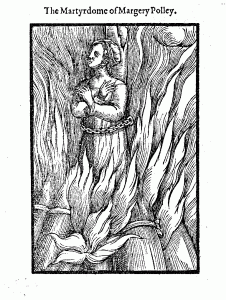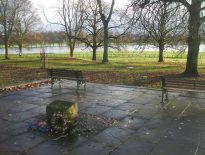 On this day in history, 17th July 1555, Protestants Margaret (Margery) Polley and Christopher Wade (Waid) were burned for heresy. Wade was a linen-weaver from Dartford and Polley was a widow from Pepenbury, Tunbridge Wells.
On this day in history, 17th July 1555, Protestants Margaret (Margery) Polley and Christopher Wade (Waid) were burned for heresy. Wade was a linen-weaver from Dartford and Polley was a widow from Pepenbury, Tunbridge Wells.
Martyrologist John Foxe described Margaret Polley as being "in the prime of her life, pious, charitable, humane, learned in the Scriptures, and beloved by all who knew her" and "the first female martyr in England", although surely that title actually belongs to Anne Askew, who was burned for heresy in 1546.
Here is John Foxe's account of the condemnations and burnings of Polley and Wade:
"Margerie polley widowe, wife sometime of Richarde polley of Pepingberie, was accused and brought before the said Maurice Bish. of Rochester, about the beginning of the moneth of Iune. Which Bishop according to the Pontificall solemnitie of that Church, rising vp out of the chaire of his maiestie, in the high swelling stile after his ordinary fashion to dash the seely poore woman, beginneth in these woordes.
We Maurice by the sufferance of God bishop of Rochester, proceeding of our meere office in a cause of heresie, against thee Margery polley, of the parish of Pepingbery of our Diocesse and Iurisdiction of Rochester, do lay and obiect against thee all & singular these articles insuing. To the which, and to euery parcell of them, we require of thee a true, full, and plaine aunswere, by vertue of thine othe thereupon to be geuen &c.
Thus the oth first being ministred, & the articles commenced against her, whiche Articles were the same ministred to Nicholas Hall and Waid before, she so framed her answeres againe, especially answering to the 3. and 4. Article, that shee neither allowed the deitie of theyr Sacrament, nor the absurdity of their masse. For the which, sentence was read against her about the beginning of Iune, and she condemned for the same. But because her death folowed not vpon the same, we wil therfore defer the tractation therof to the due place and time, first setting downe in order of historie, the execution of Christopher Waid aboue mentioned.
CHristopher Waide of Darford, in the Countie of Kent, Linnen weauer, was condemned by Maurice byshop of Rochester, and appoynted to be burned at Darforde aforesayde. At the day appoynted for his execution, which was in the moneth of Iuly, there was betimes in the morning carryed oute of the Towne in a Carte, a Stake, and therewith many bundles of Reedes, to a place a quarter of a mile out of the Towne, called the Brymthe, into a Grauell pitte thereby, the common place of the execution of felons. Thither also was brought a loade of Broome fa*ot, with other fa*ots and talwood. Vnto which place resorted the people of the Countrey in great number, and there taried his comming. In so muche that thither came dyuers Fruiterers wyth horse loades of Cherries, and sold them. About x. of the clocke commeth riding the Sheriffe, wyth a greate manye of other Gentlemen and their retinue, appoynted to assist him therein, and with them Waide riding pinioned, and by him one Margerie Polly of Tunbridge, both singing of a Psalme: whyche Margerie, as soone as she espied a farre off the multitude gathered aboute þe place where she shoulde suffer, waiting his comming, she sayde vnto hym very loude and chearefully: You maye reioyce Waide, to see suche a companie gathered to celebrate youre marriage this day.
And so passing by the place, whych ioyned harde to the hye way, they were caried streighte downe to the Towne, where shee was kepte vntill the Sheriffe returned from Waids execution. And Waid being made ready, and stripped out of his clothes in an Inne, had broughte vnto hym a faire long white Shirte from hys wife, which being put on, and hee pinioned, was led vppe on foote againe to the foresayde place. And comming straite to the stake, tooke it in hys armes, embracing it, and kissed it, setting hys backe vnto it, and standing in a pitche Barrell, which was taken from the Beacon, being hard by: then a Smith brought a hoope of yron, and wyth two staples made him fast to the stake vnder hys armes.
As soone as hee was thus setteled, hee spake wyth hys handes and eyes lifted vp to heauen, wyth a chearefull and loude voyce, the laste verse of the lxxxvi. Psalme: Shewe some good token vppon me, O Lord, that they which hate me, may see it, and be ashamed, because thou Lord hast helped me, and comforted me. Neare vnto the stake was a litle hill, vpon the top wherof were pitched vp foure staues quadrangle wise, with a couering round about like a pulpt, into the which place, as Wade was thus praying at þe stake, entred a Frier wyth a booke in his hand, whō when Wade espied, he cried earnestly vnto þe people, to take hede of the doctrine of the wh*re of Babilon, exhorting them to imbrace the doctrine of the gospel preached in K. Edward his daies. Whom the sheriffe, thus speaking to the people, often interrupted, saying, be quiet Wade, and die paciētly, I am (sayde hee) I thanke God, quiet, Maister Sheriffe, and so trust to die. All this while the Frier stoode still looking ouer the couerlet, as though he woulde haue vttered somewhat: but Wade very mightily admonished þe people to beware of that doctrine: whiche when the Frier perceiued, whether he were amased, or coulde haue no audience of the people, withdrewe himselfe oute of the place immediately wythoute speaking anye woorde, and went awaye downe to the Towne. Then the Reedes being sette about hym, he pulled them and imbraced them in his armes, alwayes with his handes (making a hole against his face, that his voyce might be heard, which they perceiuing that were hys tormentours, alwaye caste fa*ottes at the same hole, whych notwythstanding he still as he coulde put off, his face, being hurte with the ende of a fa*otte cast thereat.
Then fire being putte vnto him, he cried vnto God often, Lord Iesus receiue my soule, wythout any token or signe of impaciencie in the fire, till at lengthe, after the fire was once throughly kindled, he was hearde no man speake, still holding hys handes vp ouer hys head together towardes heauen, euen when he was dead and altogether rosted, as though they had bene stayed vppe wyth a proppe standing vnder them.
Thys signe did God shewe vppon hym, whereby his very ennemies might perceiue, that God had according to hys prayer, shewed such a token vppon hym, euen to their shame and confusion. And this was the order of this godly Martyrs execution, thys was his ende. Whereby God seemed to confound and strike with the spirit of dumbnes, the Frier that Locuste which was risen vp to haue spoken against hym: and also no lese woonderfully susteined those handes which he lifted vp to him for cōfort in his torment.
Spectatores presentes Richardus Fletcher pater, nunc Minister Ecclesiæ Crambroke, Richardus Fletcher filius, Minister Ecclesiæ Riensis."
Notes and Sources
- Foxe's Book of Martyrs or origingally called Actes And Monuments By John Foxe dated 1583 - available to read online at https://archive.org/details/ACTESAndMonumentsByJohnFoxe1583 or at https://www.johnfoxe.org/index.php?gotopage=1703&realm=text&edition=1583&gototype=&x=0&y=0.



The thing which strikes me most about so many martyrs apart from their obvious courage is how many are ordinary people, going about their lives and then suddenly it is taken in such a terrible way. One of the frightening things of heresy and witchcraft is the fact that so many people were denounced by a neighbour or parish member. You could probably denounce or report someone anonymously and people were encouraged to do so. Nothing has changed as we are now encouraged to report neighbours we may think are terrorists, but who may be doing nothing wrong. In heresy cases, it wasn’t always defined and reading many accounts, they don’t even begin to come anyway near the definition. Some cases even involved people being arrested on one charge, being found not guilty, then someone being dissatisfied making an accusation of heresy. Investigation could take some time and there were cases which were dismissed because of jealousy being a motivational reason to accuse them. However, not all cases were thorough and many magistrates were later accused of rushing to judgement. Whatever the truth, the outcome was sad and so many people died because King’s couldn’t tolerate different beliefs or the world would collapse.
The first woman martyr? Anne Askewe as Claire says was killed in 1546_and there were female Lollards and a female burning in 1510. There were female Catholic martyrs in the reign of Henry Viii and four women burnt in the reign of Edward vi. Another reason to take most of what Fox says with a pinch of salt.